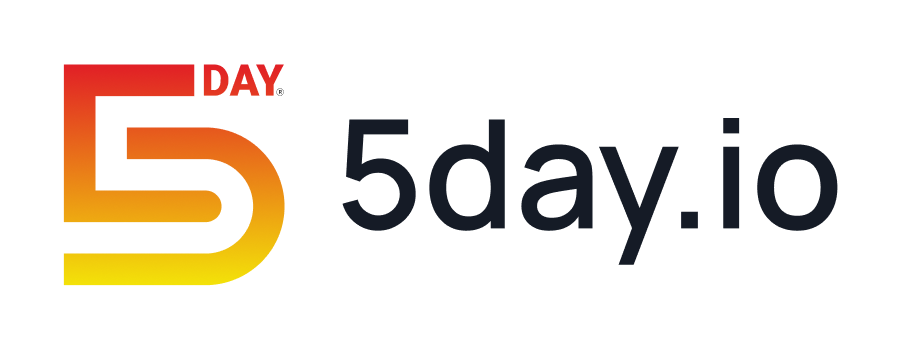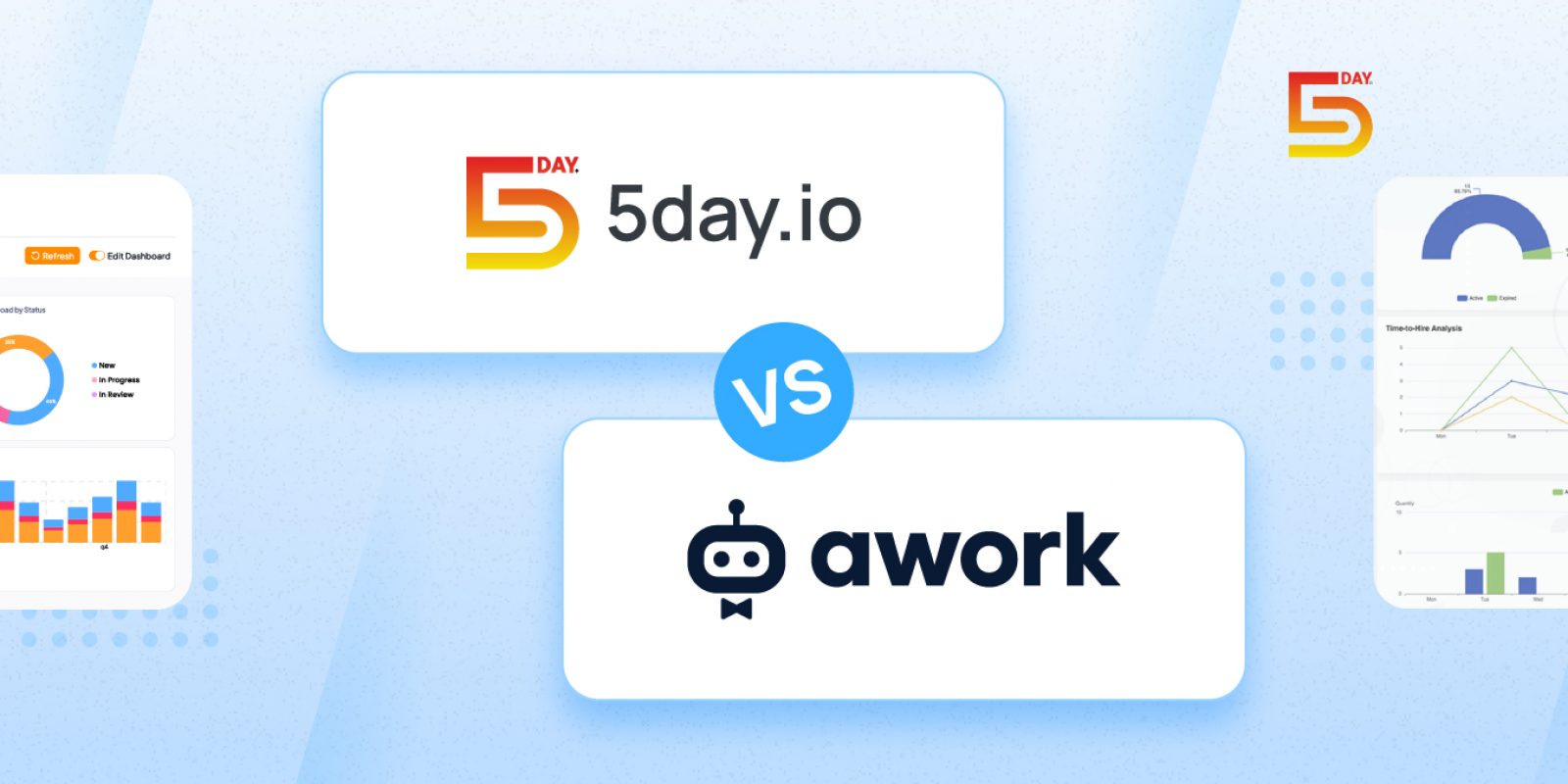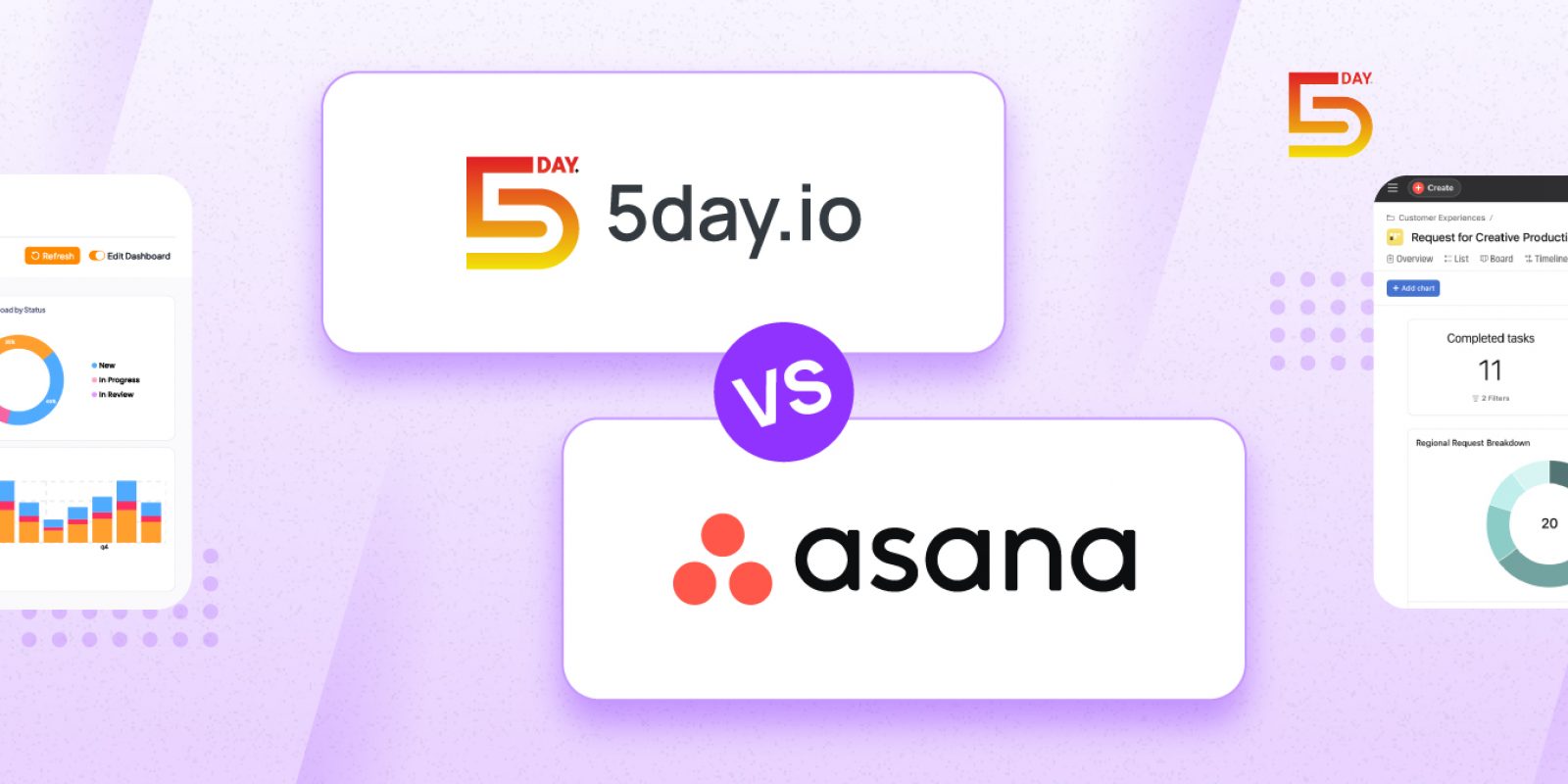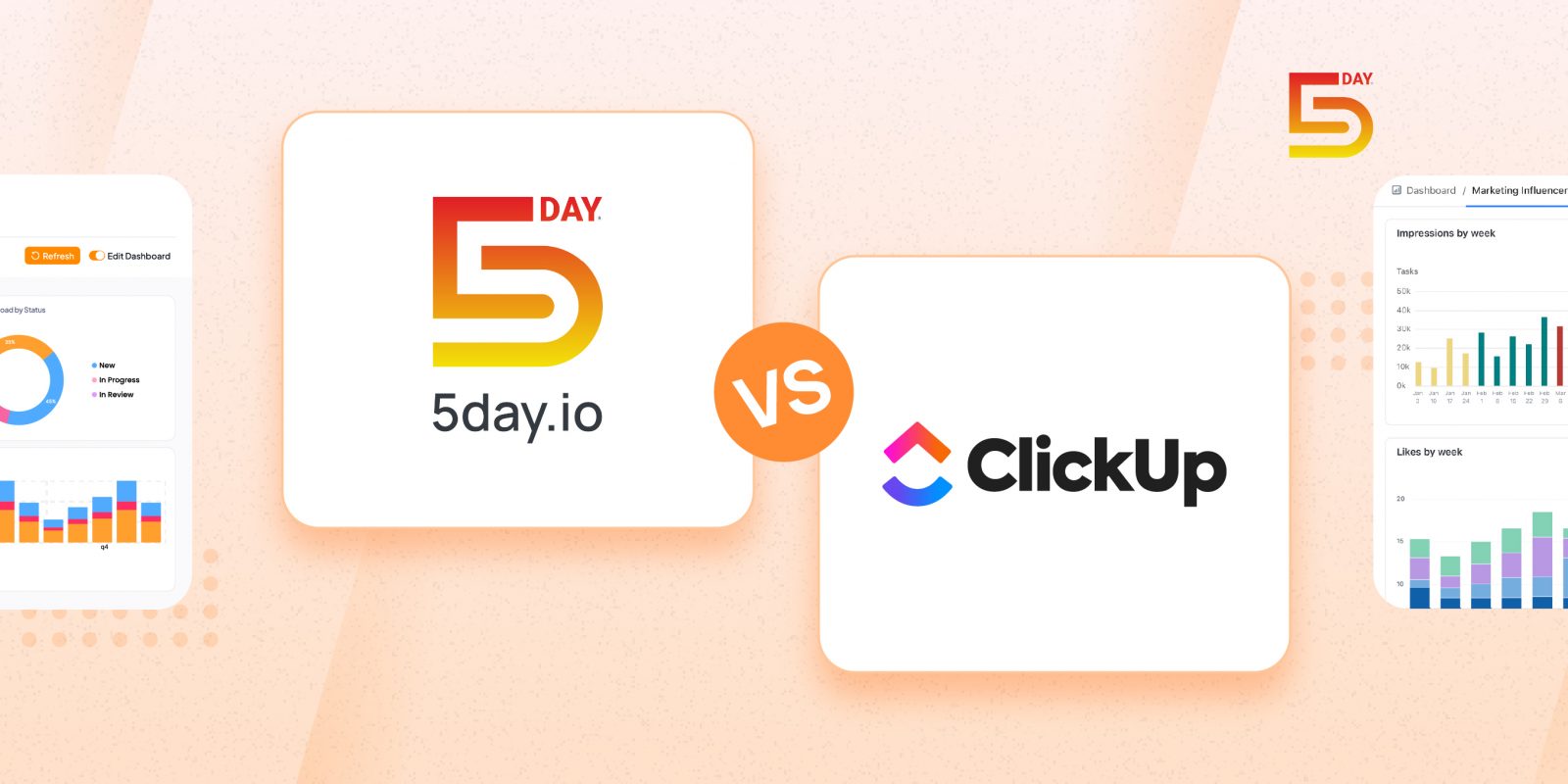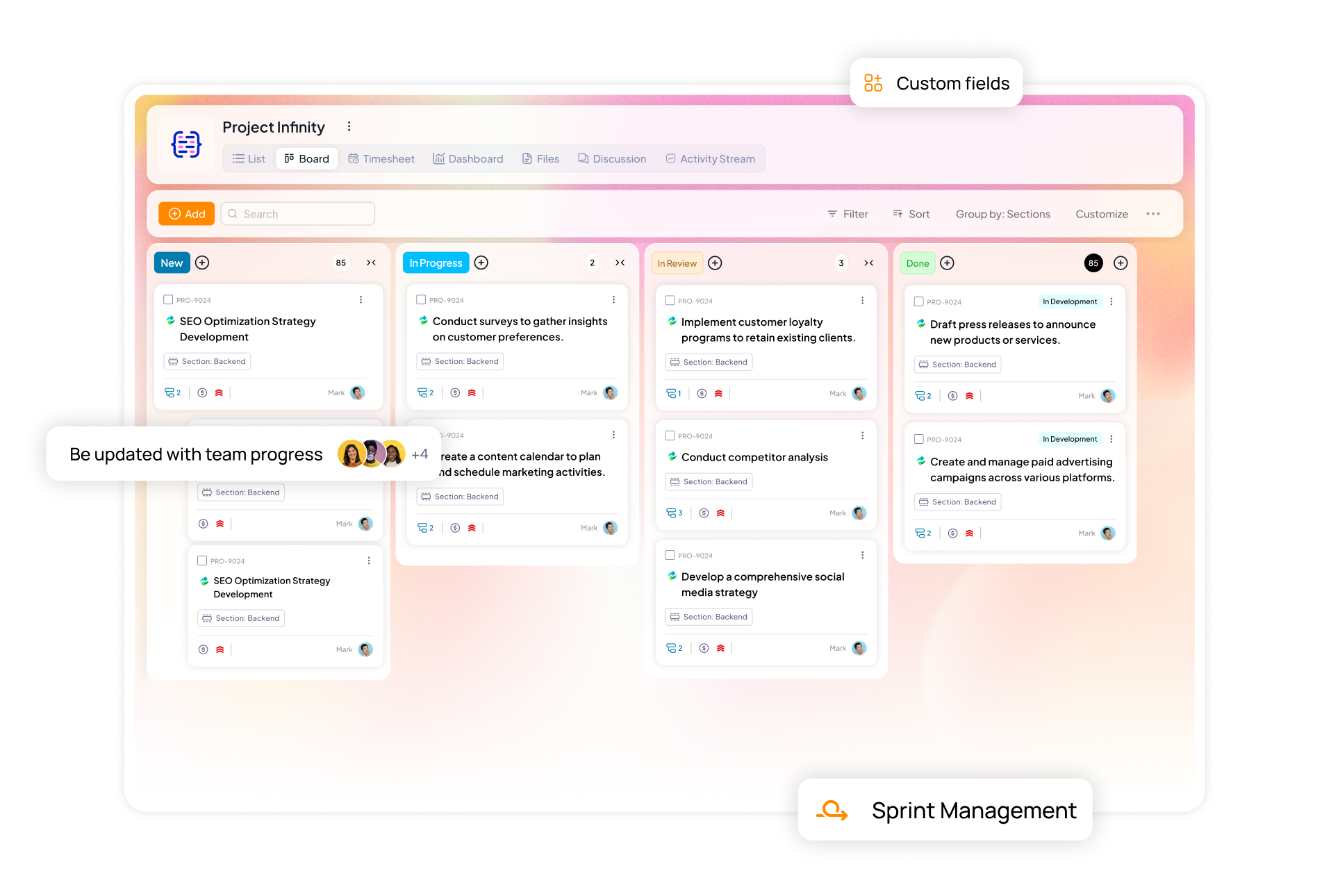Marketing teams need tools that keep them quick and organized, and finding one that does both isn’t always easy.
Monday.com is one of the most established platforms out there, known for its flexibility across different industries. 5day.io is a newer option that takes a more focused approach, building its features specifically around marketing workflows.
The two tools solve similar problems but in different ways.
Which one works better depends on what your team values most, broad customization or ready-made structures for campaigns.
In this article, we’ll compare Monday.com and 5day.io, looking at their core features, how they differ, and what to consider when deciding which is the right fit for your team.
Why marketing teams are quietly leaving Monday.com for purpose-built alternatives
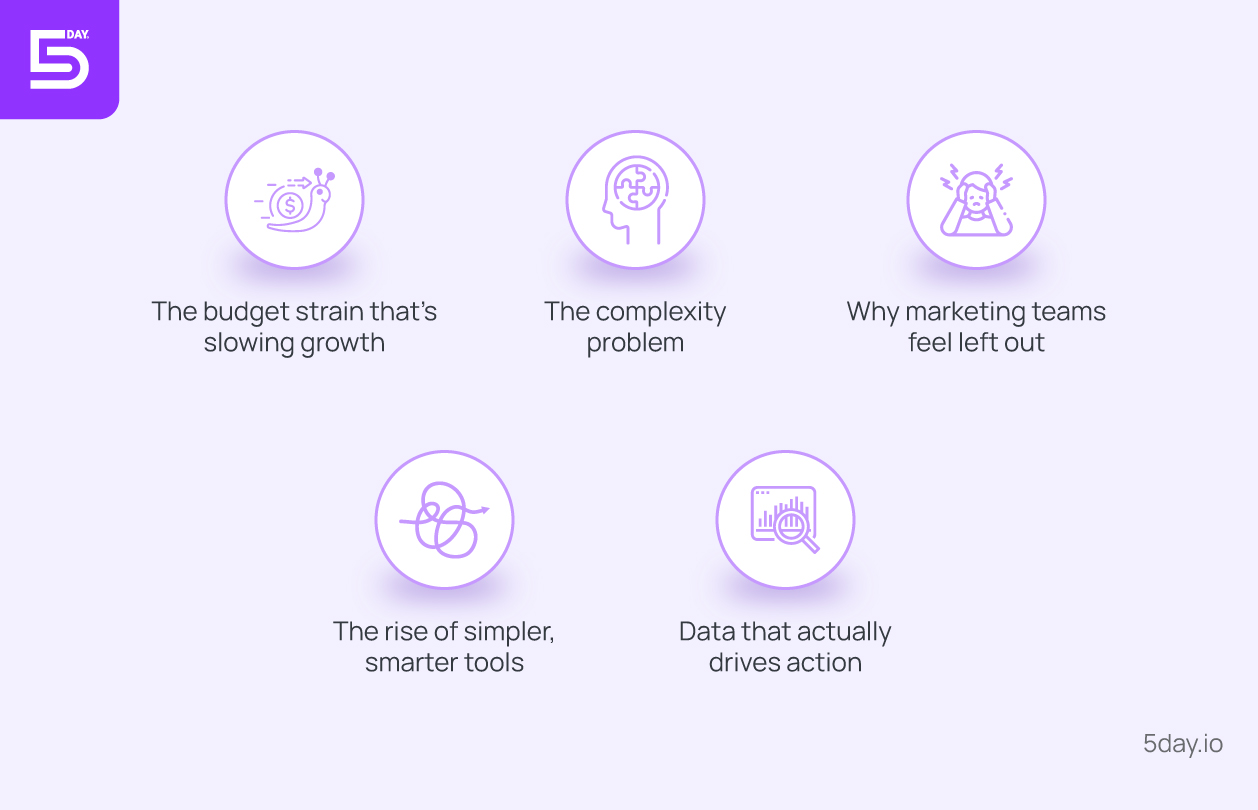
Across the globe, marketing teams are walking away from Monday.com, because it no longer fits the realities of how modern marketing operates. In 2025, platforms that drain resources instead of fueling growth quickly lose their appeal.
The budget strain that’s slowing growth
Monday.com’s pricing is a major pain point. At $9 per user per month with a minimum of 3 seats, and extra seats sold only in bundles of 5, costs add up fast. A 7-person team, for example, has to pay for 10 seats, immediately inflating costs by 43%.
For marketing agencies and startups working on razor-thin margins, that math is unsustainable. A 15-person team is looking at $180 per month on the Standard plan, and that’s before factoring in freelancers, client stakeholders, or advanced features.
Suddenly, what started as a reasonable investment becomes a heavy monthly burden.
The complexity problem
On paper, Monday.com’s biggest strength is its flexibility. But in practice, that flexibility creates a complexity trap.
A simple task like automating a social posting workflow can eat up half a day of trial and error. Onboarding new hires drags on because the platform feels overwhelming. Instead of enabling marketers to do their best work, Monday.com often turns them into part-time system admins.
Not exactly made for marketing
At its core, Monday.com was built to be a universal project management tool. That sounds great in theory, but in practice it means marketing-specific needs get overlooked.
Marketers need content calendars, creative proofing workflows, campaign timelines, and client feedback loops. Without these features, teams are forced to build clunky workarounds for basic tasks.
Read Also: 5day.io vs Notion vs Asana
The rise of simpler, smarter tools
Instead of generic boards, software like 5day.io offers dashboards tailored to each role. Copywriters see briefs and deadlines, designers see creative handoffs, and account managers track timelines and client updates, all at a glance.
In 5day.io, campaign health is visible in seconds and not hidden behind layers of screens. It’s this simplicity that makes the 5day.io vs Monday.com comparison so relevant for marketing teams today.
Data that actually drives action
Marketing project management software like 5day.io integrate analytics directly into workflows, so teams see live actionable insights, and instant reports. No more guesswork, no more spending half a day building client update.
This kind of visibility allows marketing teams to pivot quickly.
The shift is already happening
Generic platforms like Monday.com can’t keep up with the speed and complexity of marketing today. Teams are moving to marketing-first platforms that cut costs, simplify workflows, and provide real-time insights.
The future doesn’t belong to one-size-fits-all project management tools. It belongs to solutions purpose-built for marketing, tools that understand creative project management, and give teams the clarity they need to deliver.
The only real question left is: which of these specialized platforms will win over the marketing teams making the switch?
Taking a closer look at Monday.com vs 5day.io
Monday.com leans heavily on customization, users can shape workflows, and automation to fit their specific needs, which is why you’ll find it being used in industries as varied as construction and software development.
5day.io, on the other hand, is more specialized.
It was designed with marketing teams and agencies in mind, so it comes with pre-built workflows, templates, and features. So instead of starting from scratch, teams can jump right into structures that already reflect the way marketing projects usually run.
Pricing is another area where they diverge.
Monday.com charges per user, with minimum seat requirements and higher tiers for advanced features. 5day.io takes a simpler approach, offering a free tier with core functionality and consolidated premium features, without the same per-seat escalation.
Because of their different philosophies, the audiences they attract aren’t the same. Monday.com appeals to organizations across industries that want maximum flexibility and don’t mind spending time tailoring the system.
It tends to work well for teams willing to invest in setup and training to unlock highly customized workflows.
5day.io, by contrast, is aimed squarely at marketing professionals who prefer ready-to-use tools and immediate productivity, with less emphasis on heavy configuration.
5day.io vs Monday.com: A deep dive into two very different approaches
Here’s a closer look at how they stack up across the areas that matter most to teams.
Getting started
Monday.com
The platform gives you a blank board and then expects you to build a system around it. That means creating custom columns for things like “Status,” “Deadline,” and “Owner,” configuring automations to keep work moving, and designing naming conventions that won’t confuse future team members.
For example, if a marketing agency wants a content calendar, they’d need to build it manually, adding columns for draft, review, approved, and published stages, plus setting up automations for reminders.
The upside of this approach is unlimited flexibility. You can shape Monday.com to be a CRM, a construction tracker, or a social media calendar. But the downside is clear, there’s a setup and keep-up burden.
5day.io
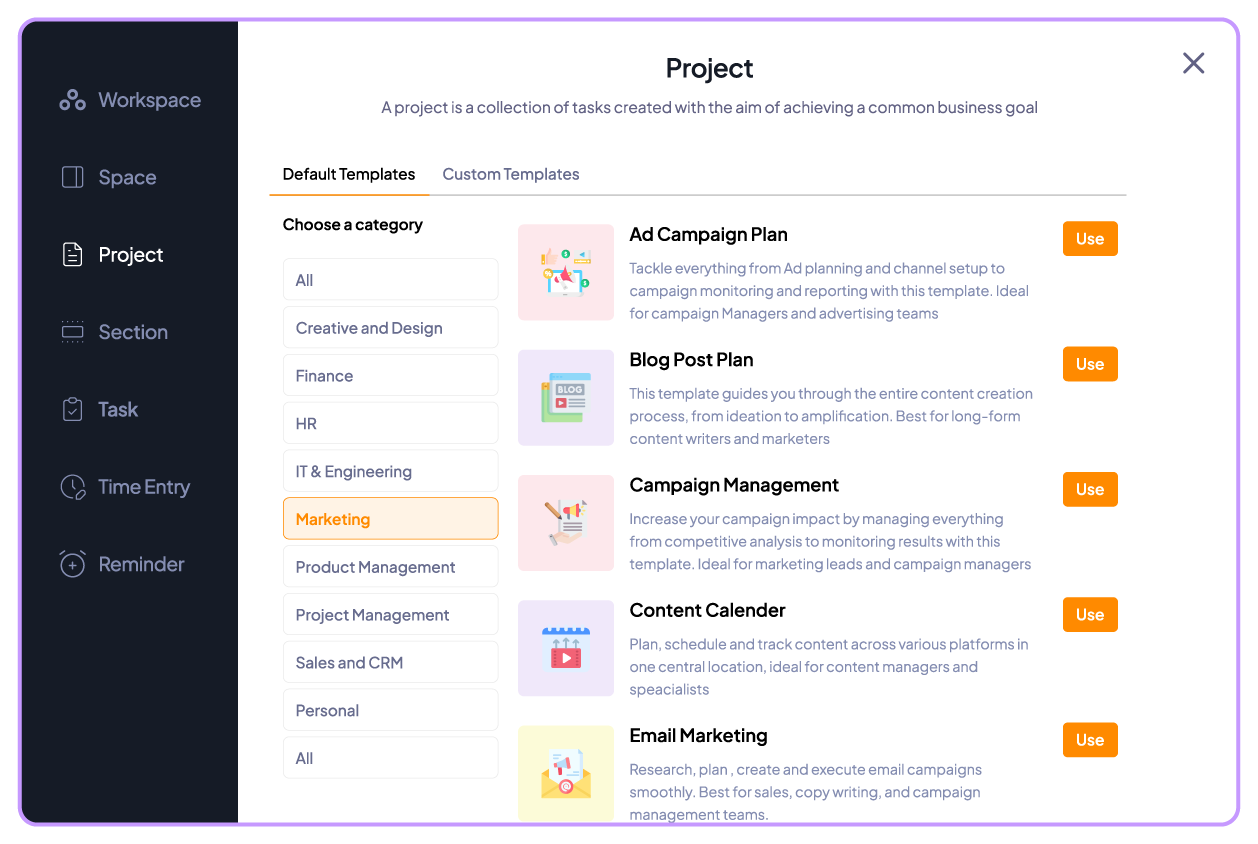
5day.io approaches onboarding differently.
Instead of a blank canvas, it gives teams 43 pre-built templates right out of the gate. For a marketing team, this might include templates for ad campaigns, client deliverables, social calendars, or event promotions. Projects follow a clear hierarchy (workspace → space → project → section), so it’s easier to keep things organized without reinventing the wheel, which is why 5day.io is an amazing alternative to Monday.com.
Read Also: How Can Marketers Get Started With 5day.io
Teams can launch projects immediately by duplicating previous work or refine their own templates over time. The learning curve is far gentler.
The best tool for you
Monday.com works best for teams that want a tailor-made system and don’t mind putting in the effort upfront, while 5day.io is ideal for marketing teams and agencies that want to get moving quickly without heavy setup.
Planning the campaign
Social media campaign planning often exposes the gap between general-purpose tools and marketing-specific ones.
Monday.com
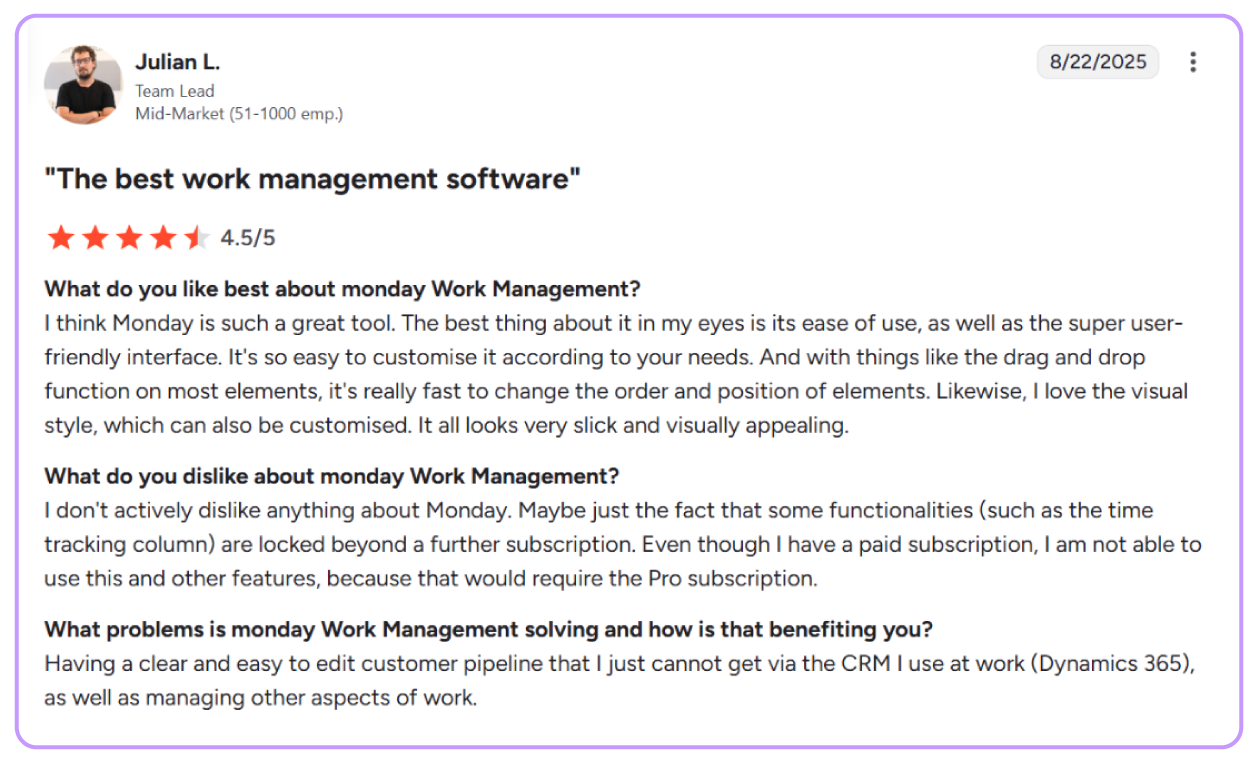
With Monday.com, campaign planning starts with building custom workflows. Teams can add fields for budgets, deadlines, creative assets, or channels. Automations can move items through a pipeline, send notifications, or update statuses when dependencies are cleared.
You can also manage complex timelines and allocate resources across multiple boards. For large, cross-functional teams, this flexibility can be invaluable.
But for marketers, it often means reinventing processes that should already exist, like setting up recurring email campaigns or managing creative approvals.
5day.io
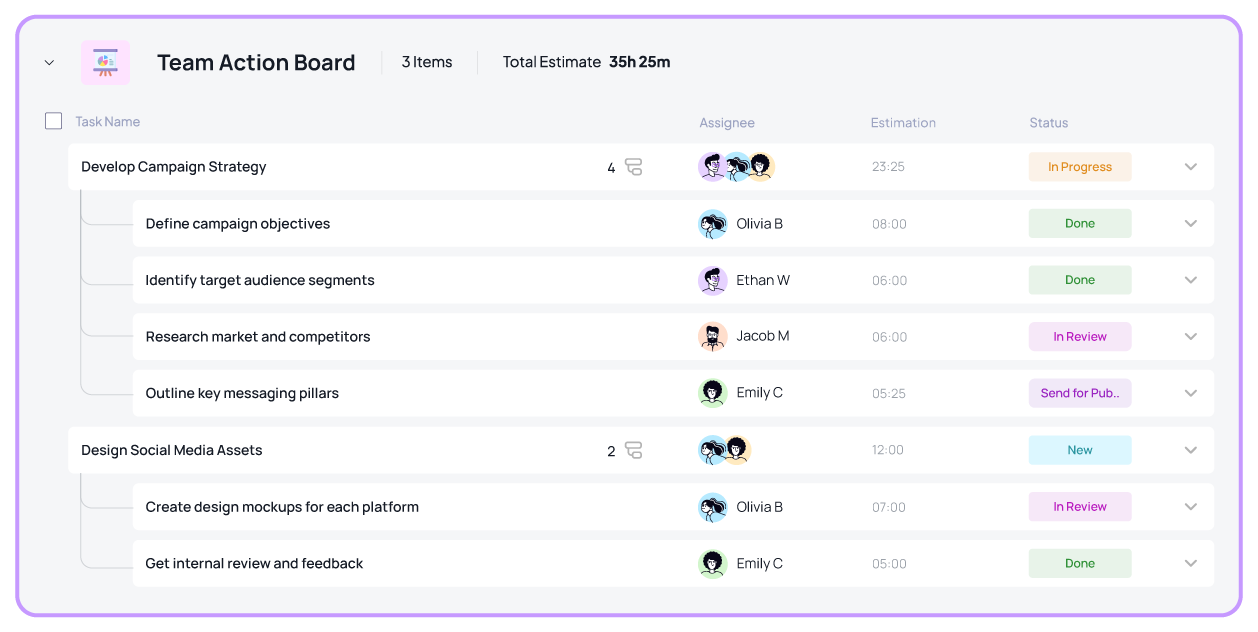
5day.io bakes marketing campaign logic into its DNA.
Assignee-wise effort estimation helps balance workloads, ensuring no one gets overloaded. Dependencies are more advanced, covering not just “finish-to-start” but also “start-to-start” or “end-to-end” relationships, critical for campaigns where creative and copy must run in parallel.
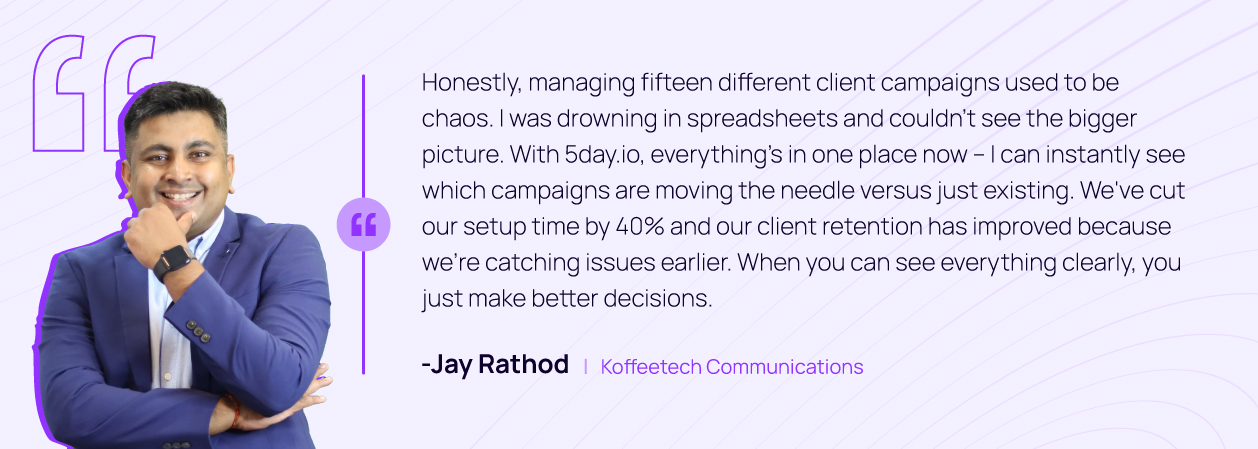
For ongoing activities like social media posts or weekly reports, recurrence rules (daily, weekly, monthly, yearly) make scheduling effortless. And if a launch date shifts, bulk updates let you adjust dozens of tasks in one move, something that can save hours. This is an unparalleled feature of 5day.io, the best Monday.com alternative.
The best tool for you
Monday.com is best for teams with complex, highly unique planning processes, while 5day.io is better suited for marketing teams running recurring campaigns that benefit from built-in campaign logic.
Working with your team
Collaboration is where many project management tools either make or break team adoption.
Monday.com
In Monday.com, collaboration happens inside each board item. Team members can comment, attach files, and use @mentions to bring in colleagues. Notifications keep everyone in the loop, and integrations with Slack or Microsoft Teams extend communication into the tools many teams already use.
While functional, the collaboration features can sometimes feel secondary, tacked onto a system originally designed for task tracking. For example, reviewing creative assets often requires external tools or additional integrations.
5day.io
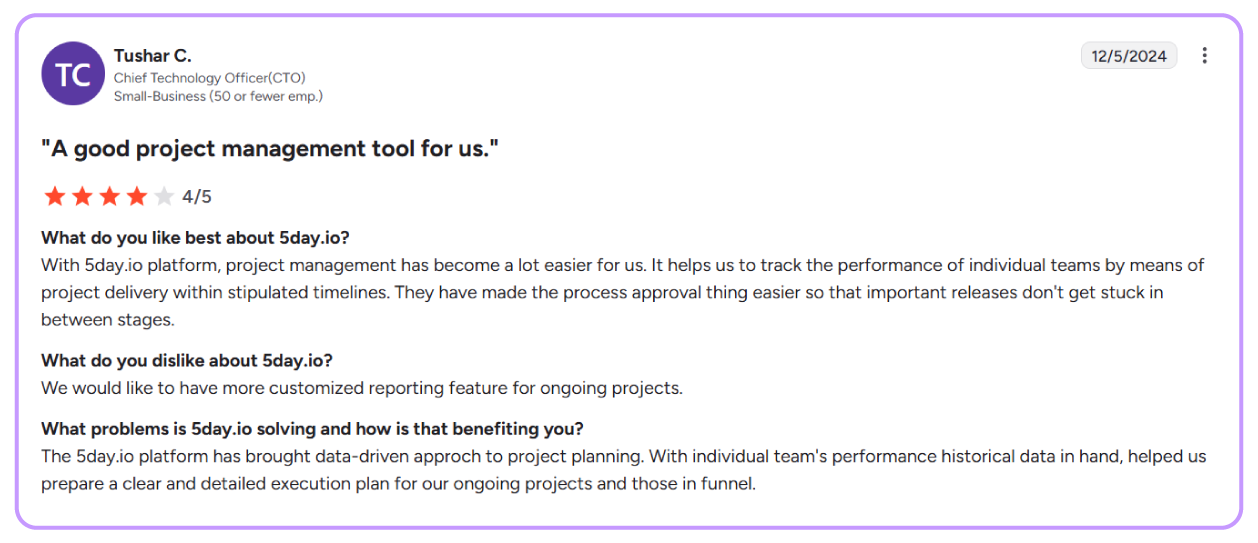
5day.io builds collaboration into the workflow itself. Each task or work item has threaded discussions where teammates can comment, reply, edit, or delete messages. You can tag not just people but also related tasks, making it easier to connect conversations across a campaign.
File collaboration is smoother too, you can upload images, videos, or other creative assets directly to tasks for centralized access. Real-time activity streams show updates as they happen, so everyone knows who changed what and when.
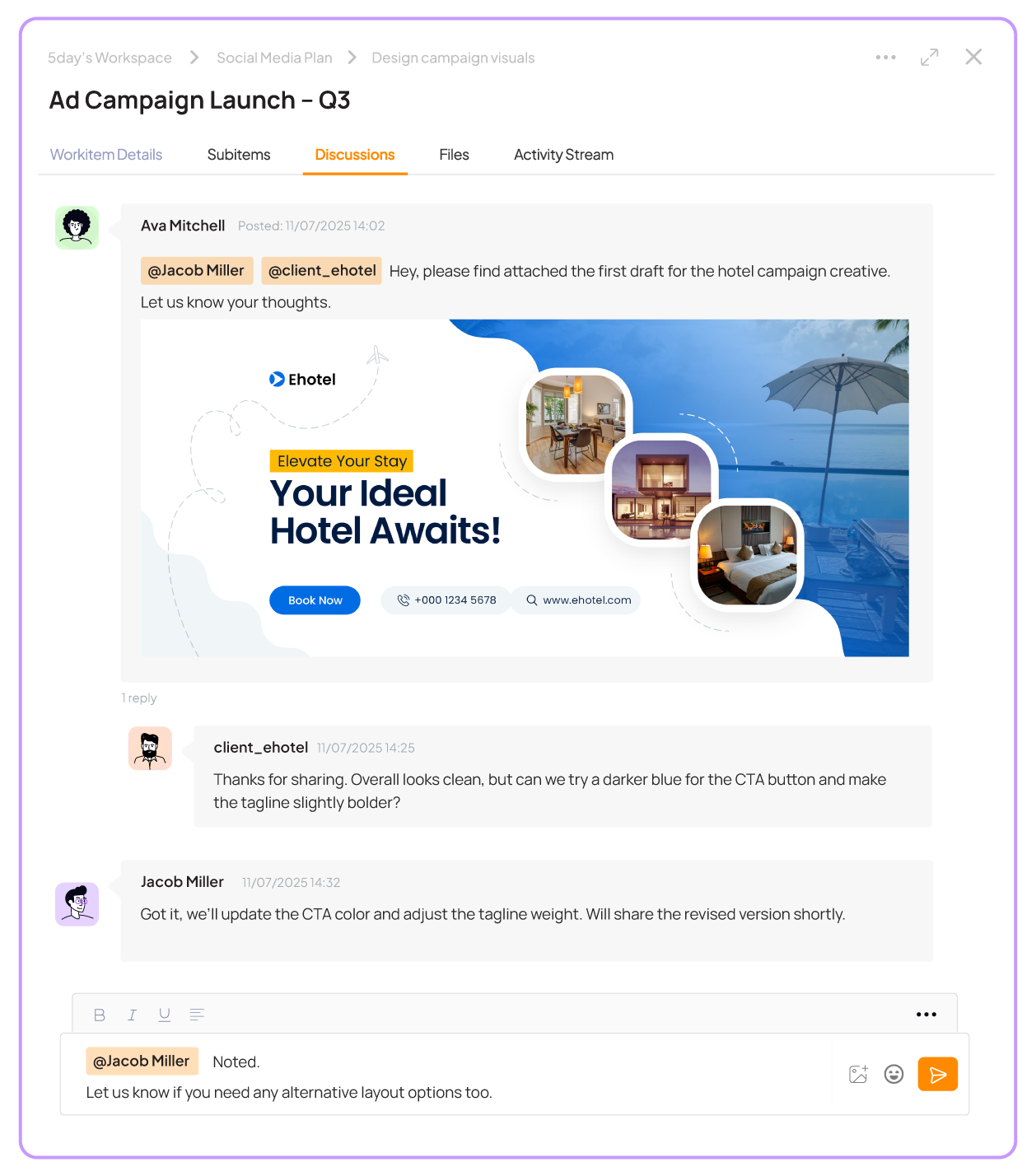
Approval workflows add another layer of structure, helping teams manage the iterative nature of creative work. Feedback loops and final signoffs happen without leaving the platform.
The best tool for you
Monday.com is well-suited for teams that already use Slack or Teams heavily and want project updates synced into their existing communication channels. 5day.io is a better fit for teams who want robust, in-platform collaboration with structured review processes.
Tracking progress
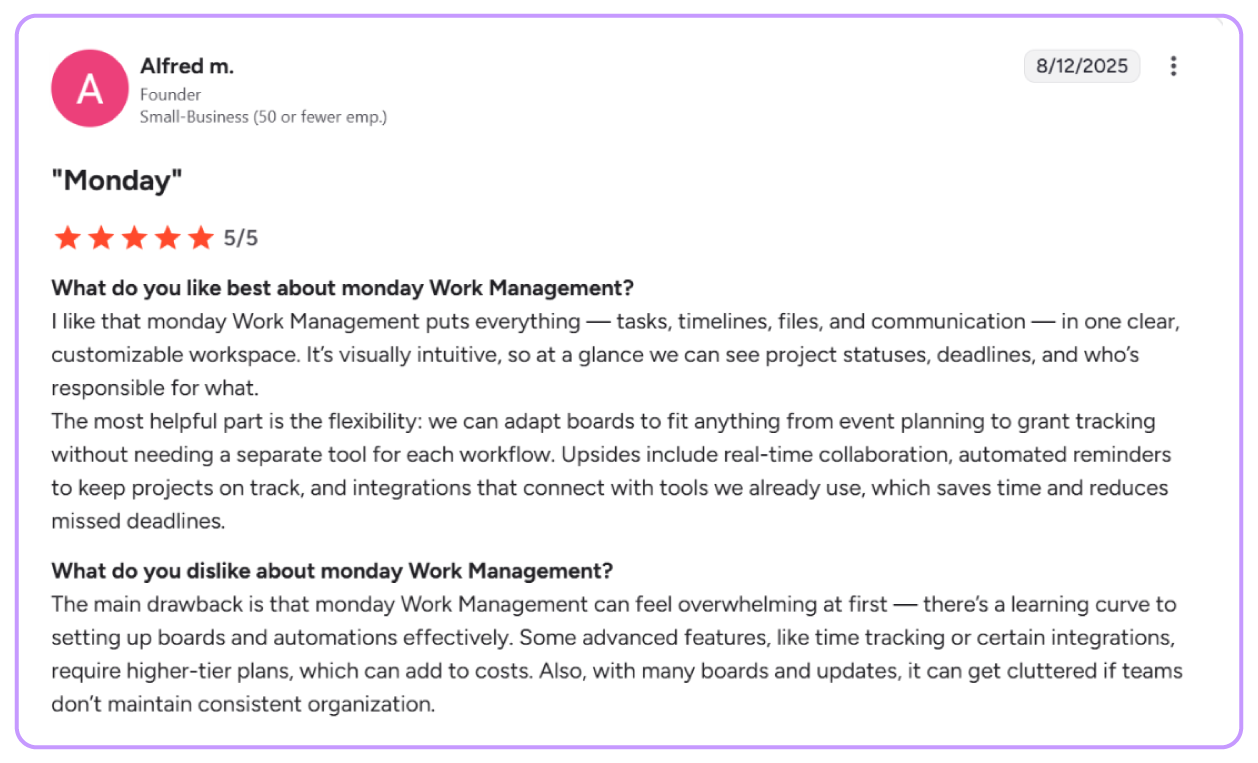
Monitoring progress and reporting client results is often where teams feel the real difference between platforms.
Monday.com
Monday.com’s reporting is highly customizable. You can build dashboards with multiple chart types and even connect external business intelligence tools for deeper analysis. This makes it very appealing to enterprises with complex reporting requirements.
However, the flexibility comes at a cost. Teams need to configure dashboards extensively to extract insights that are relevant to marketing campaigns.
5day.io
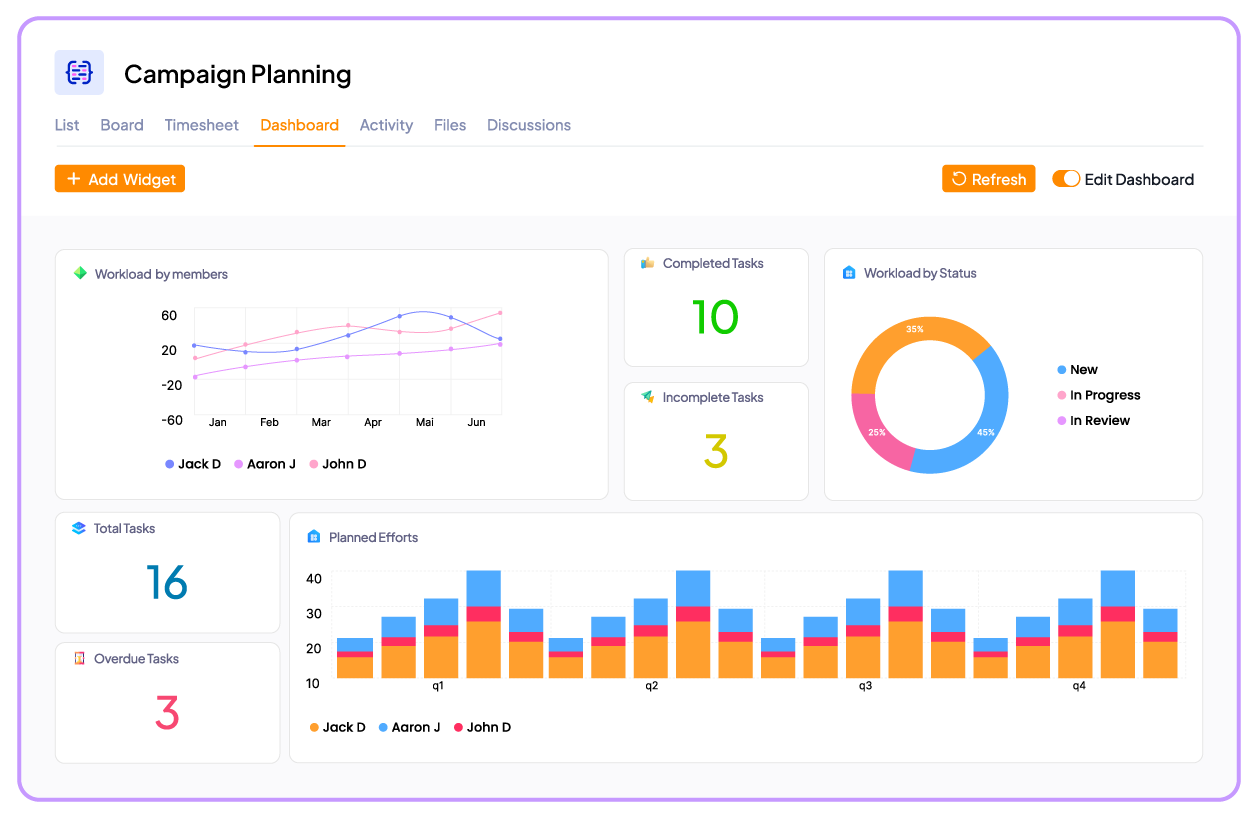
5day.io takes a more prescriptive approach.
Each project automatically comes with 8 analytics widgets, covering everything from task completion to time usage. Charts like bar, pie, doughnut, and line are ready to use, giving immediate visibility into campaign performance without additional setup.
KPIs are clearly defined, billable vs. non-billable hours, total team capacity, overtime, and workload distribution.
For marketing teams that live and die by deadlines and budgets, this level of baked-in visibility is invaluable.
The best tool for you
Monday.com is best for enterprises or cross-department teams that require highly customized and complex reporting, while 5day.io is ideal for marketing teams that want ready-to-use campaign analytics without spending hours building dashboards.
Scaling up
As teams grow, scalability challenges emerge, not just in pricing but in operations.
Monday.com
With minimum seat requirements and bundles, costs can rise quickly, especially for agencies with freelancers or external collaborators. On the positive side, Monday.com does offer enterprise-level functionality: audit logs, advanced security, and administrative controls, which are important for larger organizations.
Scaling, however, also means more boards, and more management overhead to keep workflows consistent across teams.
5day.io
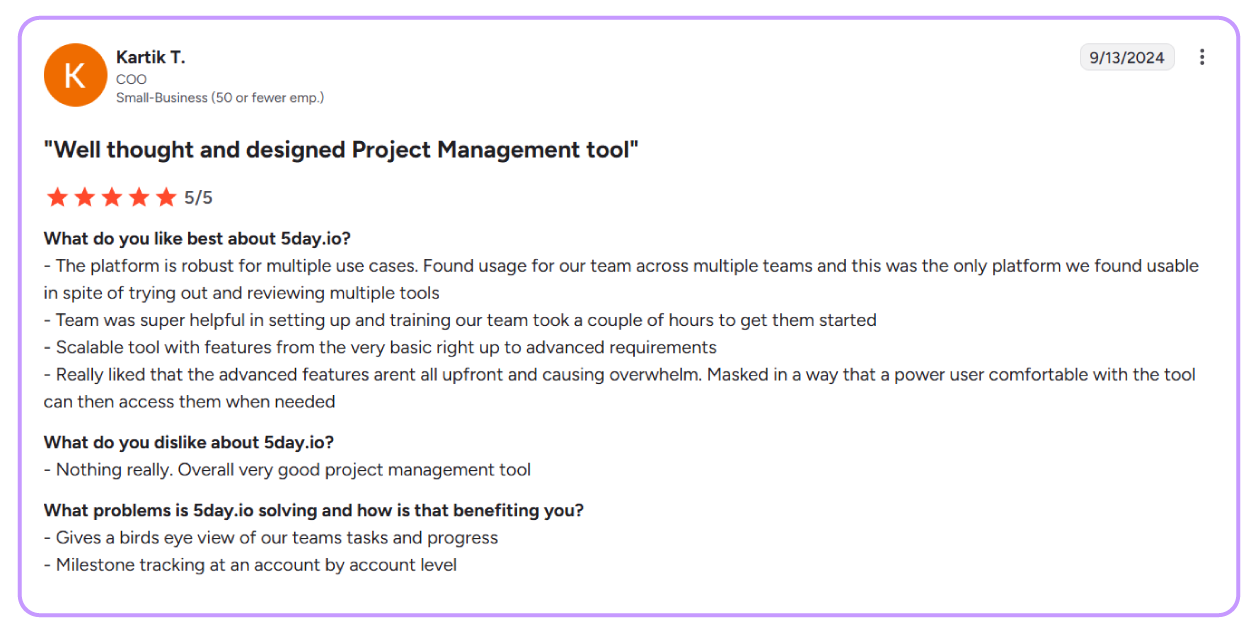
5day.io is structured for growing marketing organizations.
It supports remote marketing teams and hybrid work environments with work schedule and holiday management, so distributed teams can stay aligned. Adding new users is streamlined with bulk import options, whether manual or automated.
Roles are pre-defined, Account Owner, Admin, Manager, Member, Guest, External Member, but can also be customized for unique needs. This role system ensures that visibility and permissions scale smoothly as the organization grows.
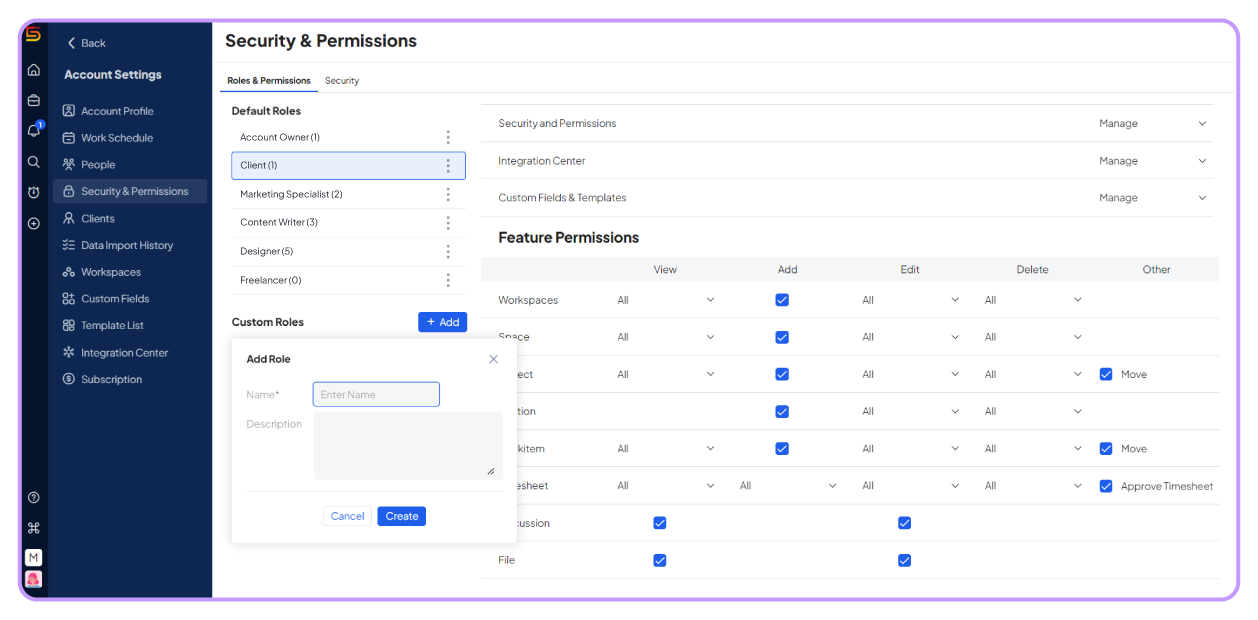
For agencies, multiple client management features allow teams to associate projects with specific clients and maintain clear boundaries across accounts.
The best tool for you
Monday.com is a strong choice for large enterprises that prioritize strict admin controls and advanced security, while 5day.io is better for growing agencies that need client, and schedule management as part of their scaling process.
Integrations
Integrations often determine whether a project management tool fits seamlessly into a company’s ecosystem.
Monday.com
Monday.com excels here. With 200+ integrations, it connects to tools like Salesforce, HubSpot, Jira, and countless others. This makes it highly attractive to enterprises with multiple business systems that need to share data.
5day.io
5day.io keeps integrations leaner and more marketing-centric. It connects with Google Drive, OneDrive, Slack, Teams, Calendar, WhatsApp, and Zapier, covering the essentials most marketing teams use daily.
The idea is to connect to the tools creative and client-facing teams rely on most.
The best tool for you
Monday.com is best for enterprises with complex tech stacks, while 5day.io is more suitable for marketing teams that want essential integrations.
Final takeaway
Both platforms solve project management in different ways. Monday.com is a blank canvas built for ultimate flexibility. 5day.io is the best project management tool for marketing teams, giving agencies and marketing teams everything ready-made.
Why 5day.io is the best alternative to Monday.com for marketing
- Monday.com is powerful but too broad for marketing-specific needs
- 5day.io narrows its focus exclusively to marketers
- It strips away irrelevant features from other industries
- Comes with 43 ready-made marketing templates
- Lets you save successful campaigns as reusable templates
- Offers unlimited customizable reporting widgets per project
- Transparent pricing with a usable free tier and no hidden costs
- Multi-tenancy support makes managing multiple clients easy
- Intuitive interface ensures smooth adoption across teams, freelancers, and clients
Wrapping Up
Monday.com is undeniably a strong and versatile platform, but its general-purpose nature often makes it cumbersome for marketing. 5day.io, built specifically for marketers, cuts through complexity. It delivers campaign-ready workflows, easy adoption, and ROI-focused insights, without draining budgets.
For small to mid-sized agencies and marketing teams, 5day.io is the best Monday.com alternative. It’s the freemium Monday.com alternative for marketing that understands your world and helps campaigns run smoother from day one.
Try 5day.io free for 30 days and see how much easier marketing project management can be.
